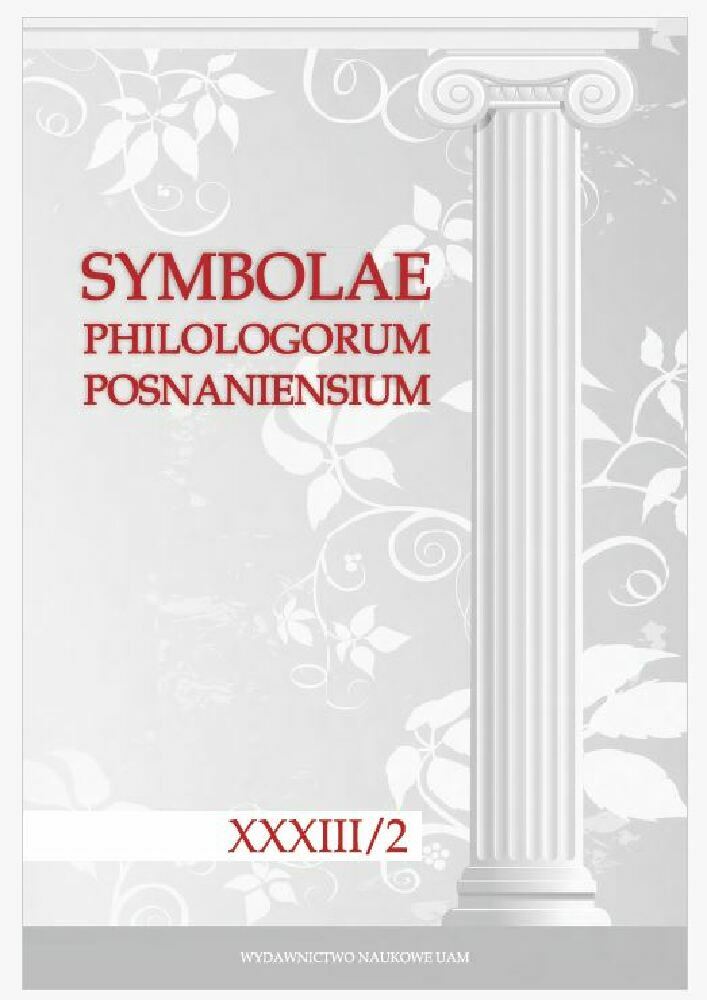Abstrakt
In this paper, constructions with transformation and identification motifs (Fraenkel, Plautine Elements in Plautus 2007) are analysed against the background of Lakoff and Johnson’s concept of metaphor (Metaphors We Live By 2003, 1st ed. 1980). The typology of these constructions as well as their wider context is presented. The paper shows that constructions with transformation and identification motifs can range from easy-tounderstand figurative expressions to riddles where two domains from distant semantic fields are connected on a very unusual ground. The constructions are highly contextual phenomena. In them, there is a playing out of various connotated meanings that depend on cultural, pragmatic, and other contexts.
Bibliografia
Lucianus. Phalaris. Hippias or The Bath. Dionysus. Heracles. Amber or The Swans. The Fly. Nigrinus. Demonax. The Hall. My Native Land. Octogenarians. A True Story. Slander. The Consonants at Law. The Carousal (Symposium) or The Lapiths. Transl. by A. M. Harmon. Loeb Classical Library 14. 1913. Cambridge, MA. DOI: https://doi.org/10.4159/DLCL.lucian-carousal_symposium.1913
Petronius, Seneca. Satyricon. Apocolocyntosis. Transl. by M. Heseltine and W. H. D. Rouse. Revised by E. H. Warmington. Loeb Classical Library 15. 1913. Cambridge, MA. DOI: https://doi.org/10.4159/DLCL.petronius-satyricon.1913
Plauti Comoediae, Vol. 2. Ed. by F. Leo. 1896. Berlin.
Plautus. Aulularia. Ed., introd., transl., and comm. by K. Maclennan and W. Stockert (Aris and Phillips classical texts). 2016. Liverpool.
Plautus. Aulularia. Ed. by W. Stockert. Editio Plautina Sarsinatis; 3., 2017. Sarsinae et Vrbini.
Plautus. Amphitryon. The Comedy of Asses. The Pot of Gold. The Two Bacchises. The Captives Ed. and transl. by P. Nixon. Loeb Classical Library 60. 1916. Cambridge, MA.
Plautus. Amphitryon. The Comedy of Asses. The Pot of Gold. The Two Bacchises. The Captives. Ed. and transl. by W. de Melo. Loeb Classical Library 60. 2011. Cambridge, MA. DOI: https://doi.org/10.4159/DLCL.plautus-two_bacchises.2011
Plautus. Casina. The Casket Comedy. Curculio. Epidicus. The Two Menaechmuses. Ed. and transl. by W. de Melo. Loeb Classical Library 61. 2011. Cambridge, MA. DOI: https://doi.org/10.4159/DLCL.plautus-casket_comedy.2011
Plautus. Epidicus. Edited with critical apparatus and commentary in which is included the work of the late Arthur L. Wheeler, by George E. Duckworth. 1940. Princeton.
Plautus. Pseudolus. Edited by D. Christenson. 2020. Cambridge.
Plautus. The Merchant. The Braggart Soldier. The Ghost. The Persian. Ed. and transl. by W. de Melo. Loeb Classical Library 163. 2011. Cambridge, MA. DOI: https://doi.org/10.4159/DLCL.plautus-braggart_soldier.2011
Plautus. The Little Carthaginian. Pseudolus. The Rope. Ed. and transl. by W. de Melo. Loeb Classical Library 260. 2012. Cambridge, MA. DOI: https://doi.org/10.4159/DLCL.plautus-pseudolus.2012
Plautus. Stichus. Three-Dollar Day. Truculentus. The Tale of a Traveling-Bag. Fragments. Ed. and transl. by W. de Melo. Loeb Classical Library 328. 2013. Cambridge, MA. DOI: https://doi.org/10.4159/DLCL.plautus-three_dollar_day.2013
Quintilianus. Institutionis oratoriae libri XII. Ed. L. Radermacher. Pars secunda, libros VII–XII continens. Addenda et corrigenda V. Buchheit. 1959. Leipzig.
Theocritus – A. S. F. Gow: Theocritus. Edited with a translation and commentary. 2 vols. Vol. I: Introduction, Text, and Translation. Vol. II: Commentary, Appendix, Indexes, and Plates. 1952. Cambridge.
Buzássyová 1996/1997: Buzássyová, Ľ. 1997. “Niekoľko poznámok k Plautovým identifikáciám.” AURIGA 38/1, 39/1: 30–42.
Dancygier – Sweetser 2014: Dancygier, B. – Sweetser, E. 2014. Figurative Language. Cambridge: Cambridge University Press.
Fraenkel 2007: Fraenkel, E. 2007. Plautine Elements in Plautus. Transl. by T. Drevikovsky and F. Muecke. Oxford: Oxford University Press. DOI: https://doi.org/10.1093/oso/9780199249107.001.0001
Fraenkel 1922: Fraenkel, E. 1922. Plautinisches im Plautus. Berlin: Weidmannsche Buchhandlung.
Fontaine 2016: Fontaine, M. 2016. “Reconsidering Some Plautine Elements in Plautus (Amphitryo 302–7, Captivi 80–4).” The Classical Journal 111, 4: 417–427. DOI: https://doi.org/10.1353/tcj.2015.0054
Forcellini 1868: Forcellini, Ae. 1868. Totius latinitatis lexicon, vol. IV. Prati: Typis Aldinianis.
Hofmann 1936: Hofmann, J. B. Lateinische Umgangssprache. Heidelberg: Carl Winter’s Universitätsbuchhandlung.
Knowles and Moon 2006: Knowles, M., and Moon, R. 2006. Introducing Metaphor. London: Routledge.
Krupa 1990: Krupa, V. 1990. Metafora na rozhraní vedeckých disciplín. Bratislava: Tatran. DOI: https://doi.org/10.2307/1446461
Lakoff and Johnson 2003: Lakoff, G., and Johnson, M. 2003. Metaphors We Live By. University of Chicago. (1st ed. 1980). DOI: https://doi.org/10.7208/chicago/9780226470993.001.0001
OLD 1968: Oxford Latin Dictionary. 1968. Ed. by P. G. W. Glare. Oxford: Clarendon Press.
Membrez 2019: Membrez, G. 2019. Metaphor by any other name. A cognitive linguistic reassessment of Aristotle’s theory of metaphor. In E. Mocciaro, W. M. Short (Eds.) Toward a Cognitive Classical Linguistics. The Embodied Basis of Constructions in Greek and Latin. DOI: https://doi.org/10.1515/9783110616347-009
Piaget, J. 2007: The Child‘s Conception of the World: A 20th-Century Classic of Child Psychology.
Translated by J. and A. Tomlinson. London and New York: Rowman & Littlefield Publishers, Inc. (1st published 1929).
Pieczonka 2009: Pieczonka, J. 2009. Recepcja rzymskiej myśli prawnej przez Plauta. Praca doktorska napisana pod kierunkiem Prof. dr hab. Lucyny Stankiewicz (Ph.D. thesis). Wrocław: Uniwersytet Wrocławski.
Pinkster 2015: Pinkster, H. 2015. The Oxford Latin Syntax: Volume 1: The Simple Clause. Oxford: Oxford University Press. DOI: https://doi.org/10.1093/acprof:oso/9780199283613.003.0001
Prescott 1907: Prescott, H. W. 1907. “Agnus curio in Plautus Aulularia 562, 563.” Philology 2, 3: 335–336. DOI: https://doi.org/10.1086/359056
Licencja
Prawa autorskie (c) 2023 Ľudmila Eliášová Buzássyová

Utwór dostępny jest na licencji Creative Commons Uznanie autorstwa 4.0 Międzynarodowe.

